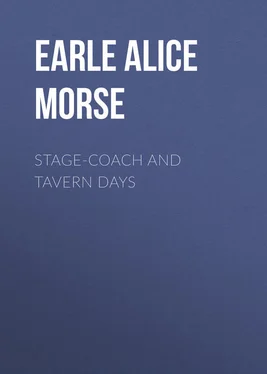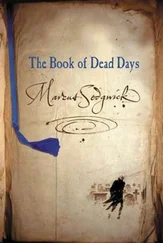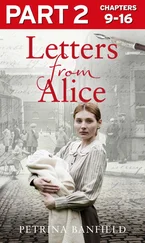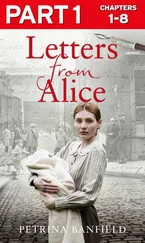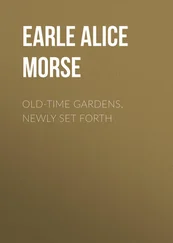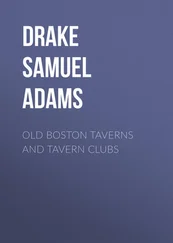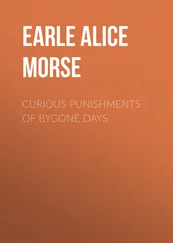Alice Earle - Stage-coach and Tavern Days
Здесь есть возможность читать онлайн «Alice Earle - Stage-coach and Tavern Days» — ознакомительный отрывок электронной книги совершенно бесплатно, а после прочтения отрывка купить полную версию. В некоторых случаях можно слушать аудио, скачать через торрент в формате fb2 и присутствует краткое содержание. Жанр: foreign_antique, foreign_prose, на английском языке. Описание произведения, (предисловие) а так же отзывы посетителей доступны на портале библиотеки ЛибКат.
- Название:Stage-coach and Tavern Days
- Автор:
- Жанр:
- Год:неизвестен
- ISBN:нет данных
- Рейтинг книги:4 / 5. Голосов: 1
-
Избранное:Добавить в избранное
- Отзывы:
-
Ваша оценка:
- 80
- 1
- 2
- 3
- 4
- 5
Stage-coach and Tavern Days: краткое содержание, описание и аннотация
Предлагаем к чтению аннотацию, описание, краткое содержание или предисловие (зависит от того, что написал сам автор книги «Stage-coach and Tavern Days»). Если вы не нашли необходимую информацию о книге — напишите в комментариях, мы постараемся отыскать её.
Stage-coach and Tavern Days — читать онлайн ознакомительный отрывок
Ниже представлен текст книги, разбитый по страницам. Система сохранения места последней прочитанной страницы, позволяет с удобством читать онлайн бесплатно книгу «Stage-coach and Tavern Days», без необходимости каждый раз заново искать на чём Вы остановились. Поставьте закладку, и сможете в любой момент перейти на страницу, на которой закончили чтение.
Интервал:
Закладка:
But the ordinaries did scant business as lodging-places. Governor Harvey complained that he could with as much justice be called the host as the Governor of Virginia, from the great number of persons entertained by him. This condition of affairs continued outside the cities till well into this century. In the large towns, however, comfortable taverns were everywhere established; and they were, as in the Northern colonies, the gathering places of many serious and many frivolous assemblages. The best of our American taverns were found in Southern cities; Baltimore had the Fountain Inn built around a courtyard like an old English inn, and furnished very handsomely.
Few of these ancient taverns still remain. The old Indian Queen Tavern is still standing at Bladensburg, Maryland. Its picture is given opposite page 33. This view is from a painting by Mr. Edward Lamson Henry. It shows also an old stage-wagon such as was used in the eighteenth century, starting out from the tavern door. Mr. Henry has made a most exhaustive study of old-time modes of travel, as well as a fine collection of old vehicles, harnesses, costumes, etc. The copies of his paintings, which I am honored by using in this book, are in every detail authoritative and invaluable records of the olden time.
With the establishment of turnpikes, road houses multiplied, and for a time prospered. But their day was short; a typical Maryland road house is shown on page 34, far gone in a decrepit and ugly old age.
The history of Pennsylvania shows that its taverns were great in number and good in quality, especially soon after the Revolution. This would be the natural accompaniment of the excellent roads throughout the state. Philadelphia had an extraordinary number of public houses, and many were needed; for the city had a vast number of visitors, and a great current of immigration poured into that port. In the chapter on Signs and Symbols, many names and descriptions are given of old Philadelphia taverns.
The first Dutch directors-general of New Netherland entertained infrequent travellers and traders at their own homes, and were probably very glad to have these visitors. But trade was rapidly increasing, and Director-General Kieft, “in order to accommodate the English, from whom he suffered great annoyance, built a fine inn of stone.” The chronicler De Vries had often dined in Kieft’s house, and he says dryly of the building of this inn, “It happened well for the travellers.”
The Stadt Harberg, or City Tavern, was built in where now stand the warehouses, 71 and 73 Pearl Street. It was ordained that a well and brew-house might be erected at the rear of the inn; right was given to retail the East India Company’s wine and brandy; and some dull records exist of the use of the building as an inn. It had a career afterward of years of use and honor as the Stadt Huys, or City Hall; I have told its story at length in a paper in the Half-Moon Series on Historic New York.
The building was certainly not needed as a tavern, for in 1648 one-fourth of the buildings in New Amsterdam had been turned into tap-houses for the sale of beer, brandy, and tobacco. Governor Stuyvesant placed some restraint on these tapsters; they had to receive unanimous consent of the Council to set up the business; they could not sell to Indians. “Unreasonable night-tippling,” that is, drinking after the curfew bell at nine o’clock, and “intemperate drinking on the Sabbath,” that is, drinking by any one not a boarder before three o’clock on the Sabbath (when church services were ended), were heavily fined. Untimely “sitting of clubs” was also prohibited. These laws were evaded with as much ease as the Raines Law provisions of later years in the same neighborhood.
In 1664 the red cross of St. George floated over the city; the English were in power; the city of New Amsterdam was now New York. The same tavern laws as under the Dutch obtained, however, till 1748, and under the English, taverns multiplied as fast as under Dutch rule. They had good old English names on their sign-boards: the Thistle and Crown, the Rose and Thistle, the Duke of Cumberland, the Bunch of Grapes, St. George and the Dragon, Dog’s Head in the Porridge Pot, the Fighting Cocks, the White Lion, the King’s Head.
On the Boreel Building on Broadway is a bronze commemorative tablet, placed there in 1890 by the Holland Society.
The site of this building has indeed a history of note. In 1754 Edward Willet opened there a tavern under the sign of the Province Arms; and many a distinguished traveller was destined to be entertained for many a year at this Province Arms and its successors. It had been the home residence of the De Lanceys, built about 1700 by the father of Lieutenant-Governor James De Lancey, and was deemed a noble mansion. The Province Arms began its career with two very brilliant public dinners: one to the new English Governor, Sir Charles Hardy; the other upon the laying of the corner-stone of King’s College. A grand function this was, and the Province Arms had full share of honor. All the guests, from Governor to students, assembled at the tavern, and proceeded to the college grounds; they laid the stone and returned to Landlord Willet’s, where, says the chronicle, “the usual loyal healths were drunk, and Prosperity to the College; and the whole was conducted with the utmost Decency and Propriety.”
In 1763 the Province Arms had a new landlord, George Burns, late of the King’s Head in the Whitehall, and ere that of the Cart and Horse. His advertisements show his pretensions to good housekeeping, and his house was chosen for a lottery-drawing of much importance – one for the building of the lighthouse at Sandy Hook. This lottery was for six thousand pounds, and lighthouse and lottery were special pets of Cadwallader Colden, then President of his Majesty’s Council. Lotteries were usually drawn at City Hall, but just at that time repairs were being made upon that building, so Mr. Burns’s long room saw this important event. The lighthouse was built. The New York Magazine for 1790 has a picture and description of it. It is there gravely stated that the light could be seen at a distance of ten leagues, that is, thirty miles. As the present light at Sandy Hook is officially registered to be seen at fifteen miles’ distance, the marvel of our ancestors must have shone with “a light that never was on land or sea.”
Troublous times were now approaching. George Burns’s long room held many famous gatherings anent the Stamp Act – at the first the famous Non-Importation Agreement was signed by two hundred stout-hearted New York merchants. Sons of Liberty drank and toasted and schemed within the walls of the Province Arms. Concerts and duels alternated with suppers and society meetings; dancing committees and governors of the college poured in and out of the Province Arms. In 1792 Peter De Lancey sold it to the Tontine Association; the fine old mansion was torn down, and the City Hotel sprang up in its place.
The City Hotel filled the entire front of the block on Broadway between Thomas and Cedar streets. Travellers said it had no equal in the United States, but it was unpretentious in exterior, as may be seen through the picture on the old blue and white plate (shown on page 38) which gives the front view of the hotel with a man sawing wood on Broadway, this in about 1824. It was simply yet durably furnished, and substantial comfort was found within. Though the dining room was simply a spacious, scrupulously neat apartment, the waiters were numerous and well-trained. There was a “lady’s dining room” in which dances, lectures, and concerts were given. The proprietors were two old bachelors, Jennings and Willard. It was reported and believed that Willard never went to bed. He was never known to be away from his post, and with ease and good nature performed his parts of host, clerk, bookkeeper, and cashier. When Billy Niblo opened an uptown coffee-house and garden, it was deemed a matter of courtesy that Willard should attend the housewarming. When the hour of starting arrived, it was found that Willard had not for years owned a hat. Two streets away from the City Hall would have been to him a strange city, in which he could be lost. Jennings was purveyor and attended to all matters of the dining room, as well as relations with the external world. Both hosts had the perfect memory of faces, names, and details, which often is an accompaniment of the successful landlord. These two men were types of the old-fashioned Boniface.
Читать дальшеИнтервал:
Закладка:
Похожие книги на «Stage-coach and Tavern Days»
Представляем Вашему вниманию похожие книги на «Stage-coach and Tavern Days» списком для выбора. Мы отобрали схожую по названию и смыслу литературу в надежде предоставить читателям больше вариантов отыскать новые, интересные, ещё непрочитанные произведения.
Обсуждение, отзывы о книге «Stage-coach and Tavern Days» и просто собственные мнения читателей. Оставьте ваши комментарии, напишите, что Вы думаете о произведении, его смысле или главных героях. Укажите что конкретно понравилось, а что нет, и почему Вы так считаете.
